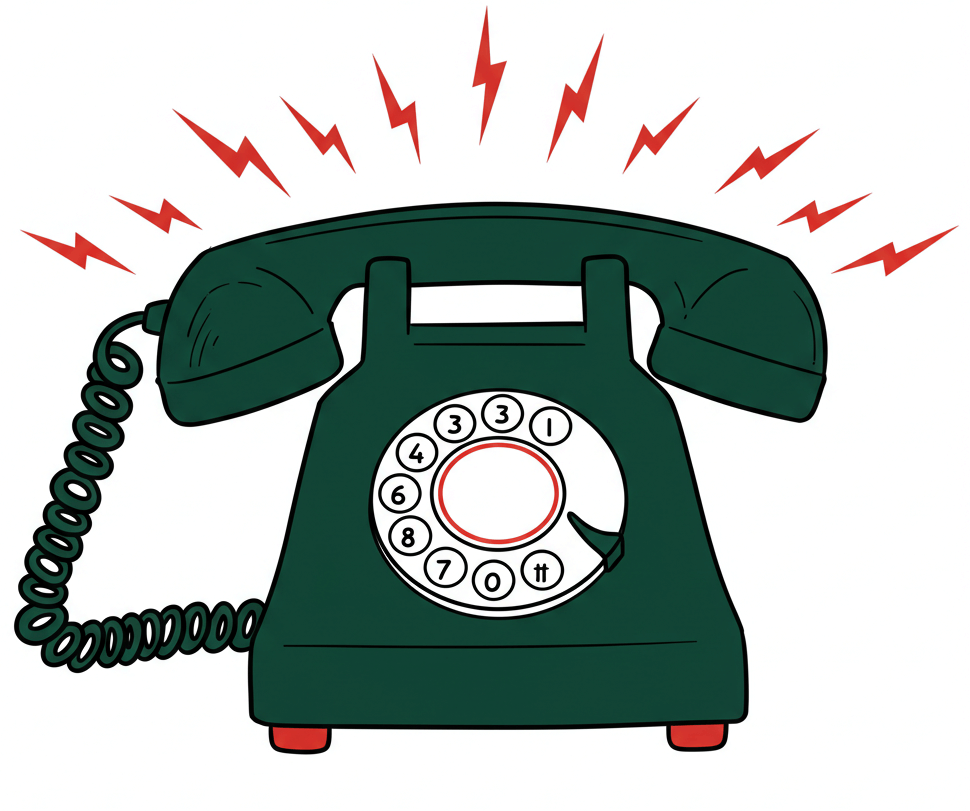Even in an age dominated by Zoom calls and video-based assessments, the humble phone interview hasn’t gone anywhere. Why? Because it’s efficient. Recruiters can screen dozens of candidates quickly, saving in-person or video interviews for the strongest applicants. If you treat a phone call casually, you risk getting screened out before you’ve even had the chance to showcase your personality in person. Think of it like the trailer for a movie: if it doesn’t hook the audience, they’ll never watch the full film.
Why Phone Interview Still Matters
Every word, pause, and detail shapes their first impression of you. So, let’s walk through the specific phone interview tips, steps, and strategies you can use to communicate confidence, showcase value, and leave the recruiter with zero doubt that you’re ready for the next round.
A phone interview might sound easier than sitting across from a hiring manager, but in reality, it sets the tone for everything that follows. Many candidates slip up at this stage because they underestimate the importance of preparation. Recruiters on LinkedIn overwhelmingly complain about their calls being sent to voicemail, candidates ghosting them, and then trying to call back when they are on the call with another job seeker, or taking a call in a loud environment where a calm conversation is not possible.
Preparing - Before the Call
Think of this call as your first step in the interview process - the recruiter is already evaluating how clearly you express yourself, how engaged you seem, and whether your professionalism matches what the role requires. When you prepare well, you reduce nerves and increase confidence, which makes it much easier to connect. Good preparation goes beyond having your resume nearby; it includes researching the company, reviewing the job description, thinking through possible questions, and creating a quiet space where you can focus. When you do these things in advance, you are far more likely to answer thoughtfully, stay calm, and present yourself as the strong candidate you truly are.
Research the Company and Role
First order of business is understanding exactly who you are speaking with (company recruiter, hiring manager, or a third-party) and what the role demands. Reading about the company’s values, mission, and culture would be a good start. Then check if there are any recent press releases or major news updates to get a sense of how the company is evolving and where they are placing their priorities. Goes without saying that you should carefully study the job description, highlight important keywords and responsibilities, and map them to your own skills, accomplishments, and career goals. This step helps you connect the dots in a way that makes your answers sound both relevant and intentional. Candidates who decide to "wing it" can come off as generic and, even worse, ramblers.
Review Your Resume & Application
A recruiter will almost always ask you to walk through your resume, and this is where many candidates lose focus. Instead of repeating what is written on the page, aim to bring your resume to life with context and storytelling. Practice connecting your past experiences directly to the role you are interviewing for (might we recommend the STAR interview method?). For example, if you once led a project that improved efficiency by 20%, explain what challenges you faced, how you solved them, and why it mattered. If you recently learned a new skill that directly applies to this job, highlight it and show enthusiasm for how it will help you succeed. Keep your resume nearby as a reference point so you do not stumble on dates or details, but resist the urge to read word-for-word. The goal is to sound prepared and confident, not rehearsed. Show them the person behind the bullet points.
Create a Quiet and Professional Environment

Your environment matters more than most candidates realize - even the strongest answer loses impact if the interviewer is distracted by a crying baby, barking dog, or traffic noise. It instantly shifts focus away from you. Choose a quiet space where you can concentrate, and make sure anyone around you knows not to interrupt.
- Mute or switch off notifications on your phone and computer so you are not tempted to glance at a message mid-interview.
- If possible, sit at a desk or table rather than lounging on the couch. It may seem small, but your posture affects how confident and professional you sound.
Creating the right environment not only helps the interviewer take you seriously but also helps you stay calm and in control throughout the conversation.
Test Your Technology
It may feel unnecessary for a simple phone call, but technology issues can derail a great interview in seconds. Is your phone fully charged? Do you have a strong signal in the area where you will take the call? If you plan to use earbuds or a headset, test them in advance to confirm the microphone is clear and the connection is stable. Some job seekers even place a quick call to a friend or a loved one beforehand to double-check that their audio quality is strong. And consider having a backup plan ready in case your main device fails, such as another phone or a landline (always notify the interviewer about this in case you are not 100% sure about your primary choice). These small steps show professionalism and prevent unnecessary stress during the interview. After all, the last thing you want is to be cut off mid-answer when you are just starting to make a strong impression.
Set the Right Mindset
Preparation is important, but mindset is what carries you through the actual interview. The way you approach a phone call directly affects how you come across, even if the recruiter cannot see you. The last thing you want is to sound unprepared or uninterested. Keep in mind: those who mentally frame it as a professional opportunity usually stand out. Your mindset influences tone, confidence, and even the way you phrase answers. Before the call, create small habits that shift you into “interview mode” so you feel calm, focused, and ready to present yourself at your best.
Treat It Like a Face-to-Face Interview
What you wear might seem irrelevant, but it is not. Dressing in interview attire flips a psychological switch and helps you carry yourself more professionally. When you put on clothes that you would wear to meet someone in person, you automatically adjust your posture, energy, and mindset. This subtle change affects your voice too, making you sound more confident and polished. Even if no one sees you, imagine that they could, and act accordingly. Treating the phone call as seriously as a face-to-face meeting ensures you deliver the same level of focus and professionalism.
Warm Up Your Voice and Energy
Your voice is your only tool during this initial screening, so it deserves attention. Here are a few phone interview tips to warm up your voice:
- Try speaking aloud for a few minutes before the call, not to sound hoarse or raspy (or like you just rolled out of bed).
- Practice smiling while you talk - this will affect your intonation.
- Sip water to keep your throat clear.
These rituals help you sound alert and engaging rather than flat or monotone. Some candidates even read a short article aloud or practice their self-introduction in front of a mirror. A little vocal warm-up ensures that when the recruiter hears you, your voice projects energy and enthusiasm. Remember, enthusiasm is contagious, and in a phone interview, it is your strongest way to connect.
Have Notes, Not Scripts
Bullet points are your friend, scripts are your enemy. Jot down key achievements, numbers, or examples you want to highlight, as well as questions you want to ask at the end. However, resist the temptation to write out full sentences. Interviewers can immediately tell when someone is reading, as it makes you sound robotic or disconnected.
Instead, create and use short prompts that guide you naturally back to the main points you want to cover.
Using the STAR Method in Phone Interviews
One of the best ways to structure your answers is with STAR:
- Situation: Briefly set the scene.
- Task: Explain what you were responsible for.
- Action: Share what you did, step by step.
- Result: Finish with the outcome, ideally with quantifiable results.
For example, if asked to recall a challenge you have overcome, you might say something like:
- Situation: At my last job, we noticed growing customer complaints about delivery delays.
- Task: I was asked to find a solution and rectify the problem.
- Action: I implemented a new scheduling system and trained the team on its use.
- Result: Within three months, delivery complaints dropped by 40%.”
That’s short, clear, and powerful.
STAR Alternatives: SHARE, CAR, SOAR, and PAR
STAR isn’t the only method. Sometimes it feels rigid, and that’s where alternatives shine.
- SHARE (Situation, Hindrance, Action, Result, Evaluation): This adds an “evaluation” piece - what you learned from the experience. Perfect for reflective questions like “Tell me about a mistake you made.”
- CAR (Challenge, Action, Result): A stripped-down version of STAR. Useful when you’re pressed for time and need to be concise (and perfect for phone interviews, actually).
- SOAR (Situation, Obstacle, Action, Result): Great for questions about overcoming difficulties, as it highlights obstacles and how you navigated them.
- PAR (Problem, Action, Result): Especially useful in initial screenings/interviews when brevity matters. It cuts the fluff and gets right to the point.
Knowing multiple frameworks gives you flexibility. You can adapt depending on the question’s complexity and time constraints.
During the Interview
This is the stage where all your preparation and mindset pay off. A phone interview may only last 20 or 30 minutes (or even less), but every second counts. Without eye contact or body language, everything depends on your words, tone, and timing. Candidates who succeed treat the call like a conversation rather than an interrogation: they listen carefully, answer clearly, and show enthusiasm without rambling. Think of the interview as a chance to share stories that prove you are the right fit. If you stay focused, project confidence, and connect your answers back to the role, you will leave the recruiter with a strong impression that you are ready for the next step.

Answer Clearly and Concisely
Rambling is one of the quickest ways to lose a recruiter’s attention. The goal is not to give the longest answer but the clearest one. Use frameworks like STAR or CAR to keep your thoughts structured while still leaving room for personality. If a question catches you off guard, pause for a moment before answering - it shows you are thoughtful rather than rushed. Clear, concise answers also make it easier for recruiters to take notes and relay your strengths to the hiring manager. Remember, clarity is confidence, and confidence is memorable.
Avoid Monotone Speech
A flat tone can make even the best achievements sound unremarkable. Smiling while you speak instantly changes how your voice comes across, adding warmth and enthusiasm. Imagine you are telling a friend an exciting story - your energy naturally rises. Vary your pitch, emphasize important words, and avoid reading from notes in a lifeless tone. Recruiters want to hear genuine interest in both your answers and the role. A lively voice keeps them engaged and makes you stand out in a sea of candidates who may sound tired or disinterested.
Use Pauses Strategically
Silence can feel awkward, yes. But it can also work in your favor. A short pause before answering shows you are considering the question carefully instead of blurting out the first thing that comes to mind. Pauses also help you avoid filler words (“um” or “you know”), which can distract from your core message. When telling a story, use natural breaks to let your points sink in, just as a speaker would when addressing an audience. A well-placed pause signals confidence, gives the recruiter time to absorb what you said, and makes your words feel more intentional.
Listen Actively
Too many candidates focus only on what they are going to say next and forget that listening is half the conversation. Active listening is not just a soft skill often added to a resume. It means paying close attention, picking up on cues, and tailoring your answers accordingly. If the recruiter mentions that the company values collaboration - highlight a teamwork story in your response. Show you are engaged by using small affirmations like “That makes sense” or “I appreciate that clarification.” Recruiters notice when you are fully present, and it sets you apart from candidates who sound distracted or rehearsed. Listening well also helps you ask smarter follow-up questions.
Handling Common Phone Interview Questions
Certain questions almost always come up, so being ready for them is a huge advantage.
- Strengths and weaknesses: Share strengths that directly align with the role, and frame weaknesses as areas you are actively improving.
- Career goals and motivation: Show ambition, but connect it to how you plan to grow with the company.
- Salary expectations: If unsure, say you are flexible and more focused on finding the right fit. If pressed, offer a (pre-researched) range you are comfortable with.
Having thoughtful responses makes you sound prepared without being scripted, and ensures you highlight the qualities that matter most to the interviewer.
Tips for Phone Interview Etiquette
-
 Punctuality and professional greeting — Answer on the first or second ring. Start with “Hello, this is [Name],” not a casual “Hey.”
Punctuality and professional greeting — Answer on the first or second ring. Start with “Hello, this is [Name],” not a casual “Hey.”
-
 Avoid interruptions — Silence alarms, notifications, and keep your workspace distraction-free.
Avoid interruptions — Silence alarms, notifications, and keep your workspace distraction-free.
-
 Manage tone and energy - Keep enthusiasm balanced. Too low, and you sound disinterested. Too high, and you risk sounding nervous.
Manage tone and energy - Keep enthusiasm balanced. Too low, and you sound disinterested. Too high, and you risk sounding nervous.
-
 Engage the interviewer — Interviewers expect questions, as it shows you’re invested. Good options include "What challenges is the team currently facing?" or "How do you measure success for this position?"
Engage the interviewer — Interviewers expect questions, as it shows you’re invested. Good options include "What challenges is the team currently facing?" or "How do you measure success for this position?"
-
 Talking too much - Long-winded answers can blur your main point. STAR or CAR frameworks help keep things sharp.
Talking too much - Long-winded answers can blur your main point. STAR or CAR frameworks help keep things sharp.
-
 Sounding distracted or unprepared - Typing, eating, or multitasking while on the call? The recruiter can hear it. Stay present.
Sounding distracted or unprepared - Typing, eating, or multitasking while on the call? The recruiter can hear it. Stay present.
 Forgetting to follow up - Skipping a thank-you email may not instantly disqualify you, but it can put you behind candidates who do follow up.
Forgetting to follow up - Skipping a thank-you email may not instantly disqualify you, but it can put you behind candidates who do follow up.
After the Call
The call may be over, but your work isn’t finished. What you do in the hours and days after a phone interview can make just as much impact as your answers during it. Many candidates think they’re done once they hang up, but the smartest ones know this is the moment to reinforce their interest, stay fresh in the recruiter’s mind, and set themselves apart from the competition. From sending a thoughtful thank-you note to reflecting on what went well, the right follow-up actions can tip the balance in your favor for the next stage.
Send a Thank-You Note
A brief, strong thank-you note does three things: shows gratitude, reiterates interest, and reminds them of your value. Example:
Reflect and Improve for Next Time
Think of each interview as practice. After the call, note what worked, what didn’t, and how you’ll improve.
A phone interview might only last 15–30 minutes, but it can make or break your entire job search. With preparation, the right mindset, and structured answering methods like STAR (and its cousins CAR, SOAR, SHARE, and PAR), you’ll stand out as confident, professional, and ready for the next step. Your voice is your handshake, so make it strong, warm, and memorable.
